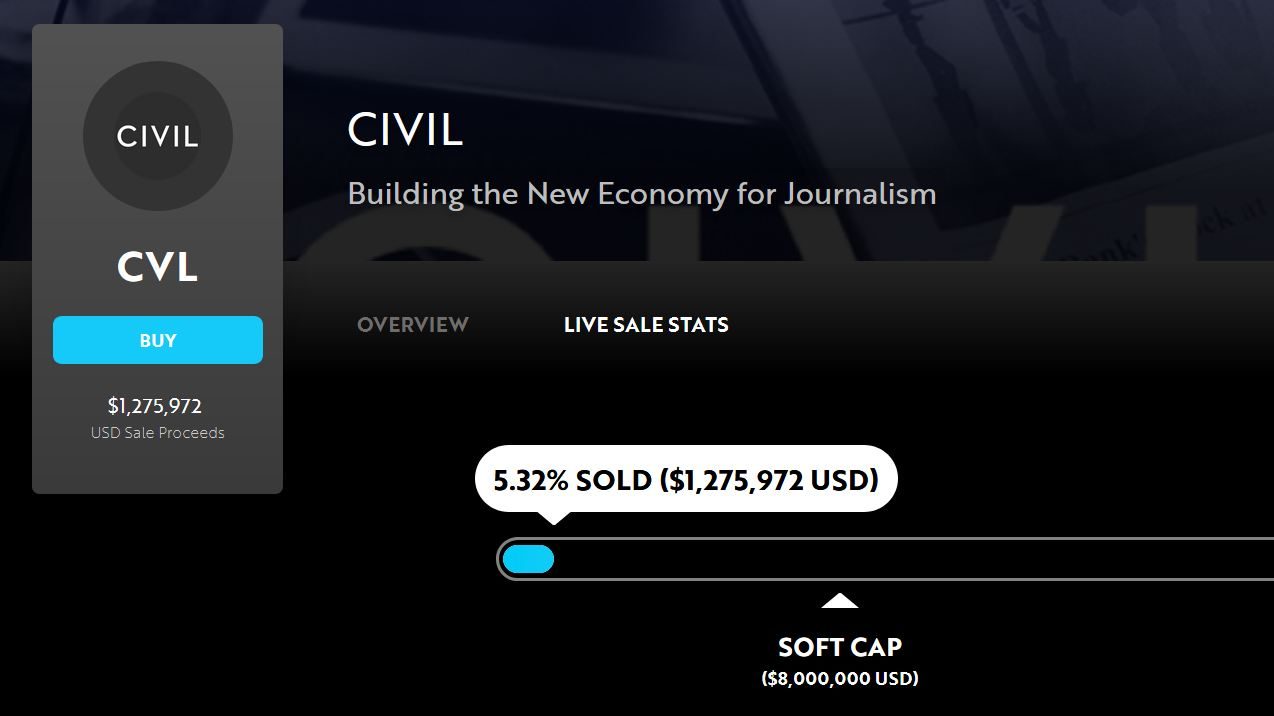The Civil token sale at Token Foundry ends in 18 days, and has so far raised about $1.287 million. The sale will be canceled if the “soft cap” of $8 million is not reached in that time. The slow pace of token sales so far has created a certain amount of skepticism regarding Civil’s chances in the media press. For example, last week at Nieman Lab, Josh Benton wrote:
Civil will need to generate at least $8 million in this initial coin offering for the sale to go forward. (If they fall short, everyone gets their money back.) As of right now, one week and about two hours into the sale, it’s only raised $1,264,841.
If the remaining 21 days of the sale go at the same rate as the first 7, then Civil won’t even touch $4 million, much less $8 million.
But that total’s a bit misleading too. Of that $1.26 million, the overwhelming majority — about 87 percent — was bought by a single entity.
I’m a huge admirer of Josh Benton and of Nieman Lab, where I’m very proud to have written before, but this is an extremely misleading read. It gives the impression that one entity (through having bought, at maximum, around five percent of 34% of the total Civil economy that is in the sale) somehow has 87% control of Civil.
In fact, though, this one entity has bought—again, at maximum—roughly .017 of the total Civil economy, just over 1.5%. Which is a lot! But it in no way indicates anything remotely approaching control. And this person is risking a lot of money for that small amount of clout. This is just math.
Again, I understand the skepticism. People don’t even quite understand what it is they’re buying when they buy tokens! It’s not the slightest bit intuitive. But in a way it’s as simple as can be. As Civil’s founder Matthew Iles said recently: Civil sells software for money. It’s software you use to fund and support journalism. That is it really! And the money you spend also goes to fund and support journalism. So the goals and the system and the funding are aligned in a way that they are often not in the traditional publishing world.
The restrictions and difficulties put in place, the requirement that you take a quiz in order to receive tokens, and so on, are appropriate for this project. They ensure that people who are going to participate on the platform are the ones who buy tokens. That means a steep learning curve for a lot of people who may not have used cryptocurrency before, and who are just learning about it now because they’re interested in this new journalism model.
There are a lot of external forces that may or may not be affecting the sale, also. With two and a half weeks still to go, ETH prices have seen a recent and substantial softening. [Editor’s note: until recently the only way you could buy Civil tokens was with ETH.] In my opinion it’s very natural that knowledgeable crypto users would adopt a wait-and-see attitude during the sale period in case ETH prices recover, since the ETH exchange rate against the Civil token price is locked in at the time of purchase. (Civil’s new ability to take dollar deposits for tokens is a very new thing, and I don’t know how it will affect the sale, though it will certainly make things easier for people who’ve never bought cryptocurrency before. We’ll be announcing the details here as they become available.)
Everyone in the media business, the business of providing you with information, is taking money to do so. Sometimes the money comes in the form of advertising; sometimes it’s cash infusions from friendly billionaires, or from reader subscriptions. Most of the criticism of Civil’s plans is not coming from business sophisticates or blockchain technology experts, but from naturally skeptical media professionals whose own work is paid for through traditional means. These means are flawed, and have resulted in lost publications, lost archives, and an excessive vulnerability of journalists to the enemies of the free press and speech rights.
Civil is proposing a new method of publishing and reading information, whereby readers can exercise some control over what happens with the money they pay for information by turning it into Civil tokens. With these, you can directly support and tip publications and writers whom you wish to support. You can use your tokens to vote for or against newsrooms that are working on projects you like or are curious about. There is more accountability and more transparency in this system than there is in existing ones for funding journalism. And there are other uses for the token that are just barely getting sketched on the drawing board right now.
Full disclosure: I’ve been working with this project for about a year now and am deeply committed to its success. Though Civil doesn’t own any part of Popula, this publication was founded through a generous grant from the company.
The triumphalist language and the naysaying around this project are equally immaterial to me. I’m working every day though to help design, build and support a publishing platform with incorruptible archiving and built-in protections against censorship and tampering. Maybe it will crash and burn at some stage, and I will cheerfully accept that moment if it ever comes—this thing has always been a huge risk! obviously. But for now, nothing has changed for me since last fall; the project is progressing well, according to my expectations, and I’m really proud to be part of it along with dozens of other talented journalists who are producing high quality publications every day. To me we really begin the day we can start using the token at Popula—sometime next month. I hope you’ll be part of it.
Maria Bustillos, Civil, blockchain, Token Foundry






